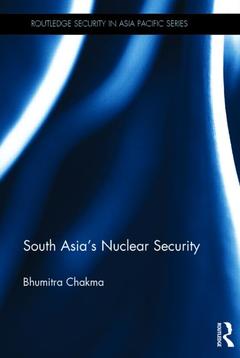South Asia's Nuclear Security Routledge Security in Asia Pacific Series
Auteur : Chakma Bhumitra

South Asia is often viewed as a potential nuclear flashpoint and a probable source of nuclear terrorism. But, how valid are such perceptions? This book seeks to address this question and assesses the region?s nuclear security from two principal standpoints. First, it evaluates the robustness of the Indo-Pakistani mutual deterrence by analysing the strength and weaknesses of the competing arguments regarding the issue. It also analyses the causes and consequences of nuclear arms race between India and Pakistan, the nature of deterrence structure in the region and the challenges of confidence building and arms control between the two countries in order to assess the robustness of South Asia?s nuclear deterrence. Second, it assesses the safety and security of the nuclear assets and nuclear infrastructure of India and Pakistan. The author holds that the debate on South Asia?s nuclear security is largely misplaced because the optimists tend to overemphasise the stabilising effects of nuclear weapons and the pessimists are too alarmists. It is argued that while the risks of nuclear weapons are significant, it is unlikely that India and Pakistan will give up their nuclear arsenals in the foreseeable future. Therefore, what needs to happen is that while nuclear elimination should be the long-term goal, in the interim years the two countries need to pursue minimum deterrence policies to reduce the likelihood of deterrence failure and the possibility of obtaining fissile materials by non-state actors.
Introduction 1. South Asia's Nuclear Evolution and Nuclear Postures of India and Pakistan 2. The Promise of Nuclear Revolution in South Asia 3. The Perils of Nuclear Revolution in South Asia 4. Causes and Consequences of the Indo-Pakistani Nuclear Arms Race 5. South Asia's Regional Nuclear Deterrence Structure 6. Nuclear Terrorism and South Asia 7. Confidence Building and Nuclear Arms Control in South Asia Conclusion: Minimum Deterrence to Nuclear Zero
Bhumitra Chakma is Senior Lecturer in the School of Politics, Philosophy, and International Studies and Director of the South Asia Project at Hull University, UK
Date de parution : 01-2015
15.6x23.4 cm
Disponible chez l'éditeur (délai d'approvisionnement : 14 jours).
Prix indicatif 172,36 €
Ajouter au panierDate de parution : 12-2017
15.6x23.4 cm
Disponible chez l'éditeur (délai d'approvisionnement : 14 jours).
Prix indicatif 61,25 €
Ajouter au panierThème de South Asia's Nuclear Security :
Mots-clés :
arsenal; minimum; building; deterrence; failure; revolution; force; indo-pakistani; weapons; states; South Asia's Nuclear Security; South Asia's Nuclear; Minimum Deterrence; Nuclear Force Building; Nuclear Weapons; Stable Deterrence; Region’s Nuclear Security; Nuclear Revolution; Deterrence Failure; Nuclear Security; Minimum Deterrence Posture; South Asia’s Nuclear Deterrence; Deterrence Structure; Tv Address; Regional Nuclear Deterrence; Complex Deterrence; Preventive Strike; Deterrence Diplomacy; Intact Nuclear Weapon; Nuclear Terrorism; Regional Deterrence; Nuclear Arms Control; South Asian Security Dilemma; Radical Pessimists; Arms Control Initiatives



